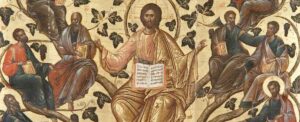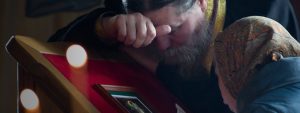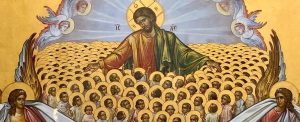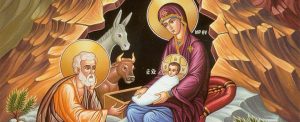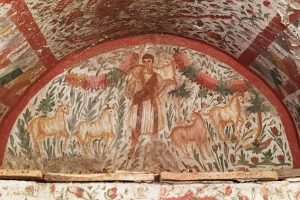John 20:19-31; Acts 5:12-20
Glory to God the Father, the Son, and the Holy Spirit.
Last week we walked with Christ through the Passion and the Cross, Christ’s burial, his plundering Hades and freeing all who were held captive from ages past, so that “Today you will be with me in Paradise” (Luke 23:43). We have celebrated Pascha and proclaimed the resurrection: Christ is risen!
Did you think we were done? Not so fast – today on the Church calendar is named Antipascha, which means Another Pascha. This feast goes on for another month and a half; we are just getting started!
Today is also named the Sunday of Saint Thomas. Last week Christ came and spoke to the other apostles, but Thomas was not there, and afterward he was thoroughly unconvinced by their story of a resurrection. “Unless I see in his hands the print of the nails, and put my finger into the print of the nails, and put my hand into his side, I’m not buying it” (John 20:25).
Is Thomas wrong? He gets stuck with the nickname “Doubting Thomas,” but did you notice last night in the Vespers hymns, we sang: “O good unbelief of Thomas… Thou didst not reject him for his faithlessness. When he saw Thy side and the wounds in Thy hands and feet, his faith was made certain. Having touched and seen, he confessed Thee.”
Because of Thomas’s insistence, we have it made crystal clear that this was no immaterial apparition, but a real, resurrection of the same body that was nailed to the Cross. Transformed, life-giving, deified, but not other than a human body.
I am kind of amused by the academics who have clever little explanations for everything in the Bible… like that Jesus didn’t really rise from the dead… it’s just that his ‘God consciousness’, spirit and memory were so powerful to his followers that when they were together after Jesus died, it almost felt like he was really there with them. ‘Yeah, remember when Jesus was dead but his spirit was so strong that it felt like he grilled us some fish on the beach? Man the memory of that guy can really make a delicious breakfast!’ (Nadia Bolz-Weber).
The lesson we learn from Thomas is not that doubt and reasoning are bad. Rather, we learn that God is not afraid of our honesty. We need to both question authority and also allow the ultimate authority to enlighten us. There are no stupid questions, and I hope no priest will ever tell you “Don’t ask that question.”
On the way to his arrest in the garden, the Lord said to his disciples,
“I go to prepare a place for you. And I will come again and receive you to myself; so that where I am, there you may be also. And where I go you know, and the way you know.”
Thomas said to Him, “Lord, we do not know where You are going, and how can we know the way?”
Jesus said to him, “I am the way, the truth, and the life. No one comes to the Father except through Me” (John 14:3-6).
There may be questions I’ll tell you are obsessive or missing the point, questions that betray assumptions not based on reality – but Christ is not about to tell you, “Thomas, your question offends me.” Instead, Christ undertakes to start you on the road to knowing him. “Now this is eternal life: that they know thee, the only true God, and Jesus Christ, whom thou hast sent” (John 17:3).
Before the cross and resurrection, the Gospels give us an idea of Thomas’s faith. On the way to resurrect Lazarus in Bethany,
He said to his disciples, “Let us go back to Judea.”
“But Rabbi,” they said, “a short while ago the Jews there tried to stone you, and yet you are going back?”
Then he told them plainly, “Lazarus is dead, and for your sake I am glad I was not there, so that you may believe. But let us go to him.”
Then Thomas (also known as the Twin) said to the rest of the disciples, “Let us also go, that we may die with him” (John 11:7-16)
Here is the faithfulness of Thomas. He doesn’t follow the Lord in order to be saved from a violent death; he is sure that by returning to Judea they’re all going to die. But: “Let us also go, that we may die with him.”
This is like the faithfulness of Job. When Job lost his home, his business, his family, and his health, his wife in despair tells him, “Do you still hold fast to your integrity? Curse God and die!” Job answers, “You are talking like a fool. Shall we accept good from God, and not trouble?… Though he slay me, yet will I praise him!” (Job 2:9-10; 13:15).
Job stays faithful to the Lord — but not without questions! The whole book of Job is a big question: Why are we suffering? If it’s not for our sins, and it’s not because God is punishing us, then why is this our experience?
King David cries out, “O God, why hast thou cast us off for ever? why does thine anger burn against the sheep of thy pasture?”
And there are no stupid questions, nothing in this offends the Lord.
Though Jesus might answer you, “Job, the world is not about you; it’s not an entirely safe or predictable world, but it is becoming what God is making it into. And God invites you to live in that real and wild and beautiful and scary world, to be blessed and to suffer, and to let God earn your trust.” (My very limited paraphrase of the final chapters of the book of Job.)
Remember the three young men in Daniel chapter 3. The king orders them to worship his idol or die in a furnace. And the young men answer, “O King, we have no need to answer you in this matter. Our God whom we serve is able to deliver us from your burning, fiery furnace. But even if he does not, we’re not going to worship your stupid idol” (Daniel 3:17-18, paraphrased).
They’re not faithful to God in order to be saved from the fire. They’re faithful to God because they have built their life on trust that God is good and will act according to his own nature for his own glory.
And, in fact, they do get thrown into the furnace. God does not exempt them from suffering. But he is there in the fire with them. And though the fire kills the men sent to add fuel, the three young men of God experience the presence and love of God.
And so, when all hope has died with the Lord on the cross, and Thomas can’t believe the others’ story that they’ve seen Jesus alive, he doesn’t turn away from his God. But he says, “Show me. And then I’ll believe.”
So when the Lord comes to Thomas, he says, “Look at my hands; touch my side. Stop doubting and believe.” And all Thomas’s questions are answered: “My Lord! And my God!”
You know, the certainty that Christ gave Thomas when Thomas’s questions were finally asked and answered launched Thomas on a mission that did not end with his martyrdom in India. Fifteen hundred years after Thomas planted the Orthodox Church in India, when Portuguese explorers and Roman Catholic missionaries arrived in Malabar, they were greeted – by indigenous Christians.
The deposit of faith that was born in Saint Thomas endured.
To the glory of God the Father, the Son, and the Holy Spirit.


